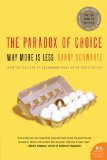
The increasing amount of choice we have now allows us to lead lives that are objectively better, but subjectively worse than before. This thought-provoking book by Barry Schwartz tries to show why the increasing amount of choice in our lives isn’t making us happier — in fact, it’s making us less happy. Fortunately, he also describes solutions to allow us to manage the negative effects of choice.
I tend to agree with him in general. Here’s a rather trivial example of a way I have tried to avoid the problem. When confronted with a restaurant menu, I try to read down the menu until I find something that sounds good to me. Then I stop, and order that thing. There are some restaurants I have been to several times where I have never read to the end of the menu, because I know that I will end up agonising over my choice and thinking I should have chosen something else anyway.
Now I realise that my life would be pretty cushy if this were the biggest problem I had to deal with. It’s not. But it does illustrate the gist of the book. “Satisficing” is the word to describe this strategy of choosing something that’s good enough, rather than holding out for “the best”, whatever that is.
Here’s my summary of the whole book. Feel free to print this out and stick it on your bedroom wall. Words to live by.
Reduce the number of options you consider. It’s easier to choose when you have fewer choices, and most of the time the reduced choices won’t lead to a significantly worse outcome.
Satisfice rather than maximise. If you can develop good standards for what is “good enough”, then you’ll usually feel better about your “good enough” choice than you would have about your “best” choice.
Minimise consideration of opportunity costs. Thinking about opportunity costs can help you avoid making a genuine blunder, but thinking too much can paralyse you.
Make decisions irreversible. Decide, accept your decision as irrevocable, and move on with the rest of your life.
Anticipate adaptation. You may be delighted with your decision now, but expect the novelty to wear off. It will. This is normal.
Curtail social comparison. There’s always somebody else who seems to have made a better choice than you. It doesn’t help you to find out who.
Acknowledge the good things in your life. Everything of any value has good and bad in it. Try to focus on the good.
Regret less. You may now regret a choice you made earlier, but that one choice probably didn’t change your life as much as you think. And at the time it was probably the best choice you could make.
Putting all these strategies together may help you to spend less time choosing, and more time living.
Pingback: The Laws of Simplicity — John Maeda « Semicolon
Pingback: The Soul of the Marionette — John Gray | Bennettarium